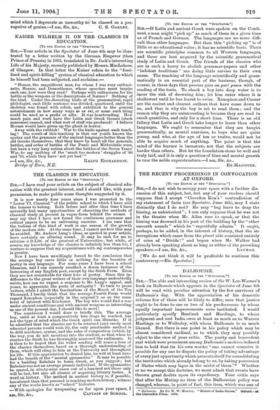It is now nearly four years since I was promoted
to the "Lower VI. Classical" of the public school to which I have still the honour to belong. Both before and after that time I have naturally had many opportunities of observing the methods of classical study at present in vogue from behind the scenes. I may say that I have not found the continuous grammar and critical papers to be an enlivening exercise. I am sure that the tedium of this kind of work is one reason of the growth of the modern side. At the same time, I cannot see how this may be avoided. Mr. Andrew Lang's ideas, as quoted in your article, have certainly an alluring sound. It may be rash for me to criticise a D.Litt. of the greatest of Universities; but while, of course, my knowledge of the classics is infinitely less than his, I venture to suppose that my acquaintance with my contemporaries is greater. Now I have been unwillingly forced to the conclusion that the average boy cares little or nothing for the beauties of poetry in any language. For some years I have been a school librarian, and I can scarcely recollect a dozen instances of the borrowing of any English poet, except by the Sixth Form. Even they are not remarkable for their love of poetry. Since this in- difference to the great writers of their own language undoubtedly exists, how can we expect a response to Mr. Lang's appeal, and yours, to appreciate the poets of antiquity ? To turn to prose writers, while I admit the fascinations of the March of the Ten Thousand, I hardly think that the average Fourth Form would regard Xenophon (especially in the original!) as on the same level of interest with Kitchener. The boy who would find a war under ancient conditions and with ancient weapons as interesting as one of the present day, I should like to meet! The conclusion I would draw is briefly this. The average boy, until at least a comparatively late stage be reached, has not the type of mind which the Greek spirit can illumine. If it be admitted that the classics are to be retained (and surely most educated persons would wish it), the only practicable method is to drill accidence, syntax, and the rules of composition (which, by the way, you do not mention) into the student, so that when he reaches the Sixth he has thoroughly mastered the rudiments. It is then to be hoped that his wider reading will rouse a love of the classics themselves, based on a thorough understanding of them, which will cling to him at the University and throughout his life. If this appreciation be denied him, he will at least have had the benefit of the "mental gymnastics." It may be possible for a budding Rabelais to learn Greek, as you suggest ; but Rabelais was not an average prosaic individual. If the gymnastics be spared, in ninety-nine cases out of a hundred not these only will be lost, but also all chance of acquiring literary tastes. A word on history. The method in ancient history is, if possible, less absurd than that pursued in teaching modern history; witness any of the works known as "school" histories.
—With apologies for trespassing so far upon your space, I
an. Sir, &c.. CAPTAIN OF SCHOOL.










































 Previous page
Previous page